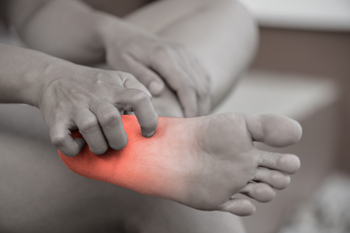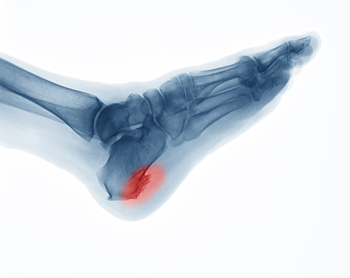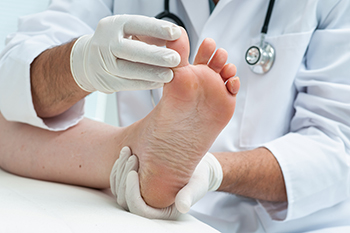December 2022
Common Symptoms of Neuropathy

The feet are typically affected with the condition that is known as peripheral neuropathy. It causes the inability to feel sensations on the feet, and existing cuts, bruises, and scrapes may go unnoticed. There are various categories of specific types of nerves, consisting of sensory, motor, and autonomic nerves. Pain and touch are products of the sensory nerves, while the motor nerves control the muscles. Automatic functions of the body come from the autonomic nerves, and bladder function and blood pressure fall into this area. The symptoms that many people experience with neuropathy can include a loss of balance, weakness in the feet, in addition to a tingling or numbing sensation in the hands and feet. Diabetic patients may be prone to developing neuropathy, and infected cuts on the feet may go unnoticed, possibly leading to serious complications. If you have any symptoms that may indicate neuropathy, it is suggested that you consult with a podiatrist who can help you to manage this condition.
Neuropathy
Neuropathy can be a potentially serious condition, especially if it is left undiagnosed. If you have any concerns that you may be experiencing nerve loss in your feet, consult with the podiatrists from New England Family Foot Care. Our doctors will assess your condition and provide you with quality foot and ankle treatment for neuropathy.
What Is Neuropathy?
Neuropathy is a condition that leads to damage to the nerves in the body. Peripheral neuropathy, or neuropathy that affects your peripheral nervous system, usually occurs in the feet. Neuropathy can be triggered by a number of different causes. Such causes include diabetes, infections, cancers, disorders, and toxic substances.
Symptoms of Neuropathy Include:
- Numbness
- Sensation loss
- Prickling and tingling sensations
- Throbbing, freezing, burning pains
- Muscle weakness
Those with diabetes are at serious risk due to being unable to feel an ulcer on their feet. Diabetics usually also suffer from poor blood circulation. This can lead to the wound not healing, infections occurring, and the limb may have to be amputated.
Treatment
To treat neuropathy in the foot, podiatrists will first diagnose the cause of the neuropathy. Figuring out the underlying cause of the neuropathy will allow the podiatrist to prescribe the best treatment, whether it be caused by diabetes, toxic substance exposure, infection, etc. If the nerve has not died, then it’s possible that sensation may be able to return to the foot.
Pain medication may be issued for pain. Electrical nerve stimulation can be used to stimulate nerves. If the neuropathy is caused from pressure on the nerves, then surgery may be necessary.
If you have any questions, please feel free to contact our office located in Milton, MA . We offer the newest diagnostic and treatment technologies for all your foot care needs.
What Causes Pain With a Heel Spur?

A heel spur can produce severe pain and discomfort, despite their small size. It is defined as a bony growth that forms on the bottom of the heel, generally as a result of consistent pressure the heel endures. Pain that often accompanies this condition is caused by an inflamed ligament that connects the heel to the toes, causing difficulty in completing daily tasks. This can happen from being obese, frequently running, or possibly from wearing shoes that do not fit correctly. Larger heel spurs may feel like a small hook on the inside of the heel that can be an inch or longer. Intense heel pain will often bring the patient to a podiatrist to have an X-ray taken, which can determine the exact size of it, although the pain is typically caused by inflammation. At the first sign of heel pain, it is strongly urged that you speak with a podiatrist who can offer treatment methods that are correct for you, which may include surgery for removal.
Heel spurs can be incredibly painful and sometimes may make you unable to participate in physical activities. To get medical care for your heel spurs, contact the podiatrists from New England Family Foot Care. Our doctors will do everything possible to treat your condition.
Heels Spurs
Heel spurs are formed by calcium deposits on the back of the foot where the heel is. This can also be caused by small fragments of bone breaking off one section of the foot, attaching onto the back of the foot. Heel spurs can also be bone growth on the back of the foot and may grow in the direction of the arch of the foot.
Older individuals usually suffer from heel spurs and pain sometimes intensifies with age. One of the main condition's spurs are related to is plantar fasciitis.
Pain
The pain associated with spurs is often because of weight placed on the feet. When someone is walking, their entire weight is concentrated on the feet. Bone spurs then have the tendency to affect other bones and tissues around the foot. As the pain continues, the feet will become tender and sensitive over time.
Treatments
There are many ways to treat heel spurs. If one is suffering from heel spurs in conjunction with pain, there are several methods for healing. Medication, surgery, and herbal care are some options.
If you have any questions feel free to contact our office located in Milton, MA . We offer the latest in diagnostic and treatment technology to meet your needs.
Choosing the Right Shoes for Your Child

Keeping children in shoes can be challenging because their feet grow so rapidly. Here are some tips for finding the right shoes for your child. Check their shoes regularly for worn areas, seams that are stretched, and toes that are worn out. These may be signs that their shoes need to be replaced. Have the child’s foot measured each time they try on shoes so that both the length and the width are taken into account. There should be about half an inch between the end of the shoe and the toes. Avoid buying shoes that are too big for the child as this can cause falls. The heel of the shoe should fit snugly, but not too tightly. For best results, avoid the idea of breaking in the shoes at home, and instead, make sure the shoe fits well at the store. Discourage your child from wearing shoes with higher heels, as this may affect the development of healthy feet and legs. Instead, go for shoes with flatter, textured soles that can keep them from slipping and falling. For more information on the best shoes for your child, please consult a podiatrist.
The health of a child’s feet is vital to their overall well-being. If you have any questions regarding foot health, contact the podiatrists of New England Family Foot Care. Our doctors can provide the care you need to keep you pain-free and on your feet.
Tips for Keeping Children's Feet Healthy
- Make sure their shoes fit properly
- Look for any signs of in-toeing or out-toeing
- Check to see if they have Clubfoot (condition that affects your child’s foot and ankle, twisting the heel and toes inward) which is one of the most common nonmajor birth defects.
- Lightly cover your baby’s feet (Tight covers may keep your baby from moving their feet freely, and could prevent normal development)
- Allow your toddler to go shoeless (Shoes can be restricting for a young child’s foot)
- Cut toenails straight across to avoid ingrown toenails
- Keep your child’s foot clean and dry
- Cover cuts and scrapes. Wash any scratches with soap and water and cover them with a bandage until they’ve healed.
If you have any questions, please feel free to contact our office located in Milton, MA . We offer the newest diagnostic and treatment technologies for all your foot care needs.
Reminder: When Was the Last Time...?
What Does a Podiatrist Do?

Keeping your feet healthy is extremely important. To ensure proper foot health, seeing a podiatrist on a regular basis is important, especially if you have neuropathy, peripheral artery disease, or any other ailment that affects the feet. Podiatrists are doctors who specialize in conditions of the toes, feet, and ankles. Among the many conditions they are trained to deal with are ingrown toenails, heel and arch pain, gait problems, and sprains. They are also trained to work with patients who have diabetes and arthritis. Recommendations from a podiatrist may include prescription medication, exercise plans, and custom orthotics to correct biomechanical issues. A podiatrist can use imaging tests and other methods to determine the extent and severity of your foot problems. If you are seeing a podiatrist for the first visit, it is a good idea to wear the shoes you normally wear, so a diagnosis of foot alignment and wear patterns can be conducted.
If you are dealing with pain in your feet and ankles, you may want to seek help from a podiatrist. Feel free to contact the podiatrists from New England Family Foot Care. Our doctors can provide the care you need to keep you pain-free and on your feet.
What Is a Podiatrist?
A podiatrist is a doctor of podiatric medicine who diagnoses and treats conditions of the foot, ankle, and related structures of the leg. Your podiatrist may specialize in a certain field such as sports medicine, wound care, pediatrics, and diabetic care. Podiatrists have the ability to become board certified through training, clinical experience, and then taking an exam.
What Do Podiatrists Do?
On a daily basis, a podiatrist may perform the following activities:
- Diagnose foot ailments such as ulcers, tumors, fractures, etc.
- Use innovative methods to treat conditions
- Use corrective orthotics, casts, and strappings to correct deformities
- Correct walking patterns and balance
- Provide individual consultations to patients
It is very important that you take care of your feet. It’s easy to take having healthy feet for granted, however foot problems tend to be among the most common health conditions. Podiatrists can help diagnose and treat a variety of feet related conditions, so it is crucial that you visit one if you need assistance.
If you have any questions please feel free to contact our office located in Milton, MA . We offer the newest diagnostic and treatment technologies for all your foot and ankle needs.





